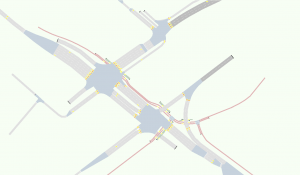SWECO – Event Driven Model with an Objective to Control Traffic Lights #SWI2020
SWECO designs and develops societies and cities of the future. This consulting company advises in sustainable buildings, efficient infrastructure, and access to electricity and clean water. SWECO is the largest engineering and consultancy company in Europe, with over 15.000 employees.
The Mobility Solutions team of SWECO actively works on optimizing traffic flows in today’s cities, while preparing the city for a driverless tomorrow. Keeping cities accessible and moving is one of the biggest challenges road authorities face today. Urban areas contain millions of sensors, ranging from loop detectors embedded in the road to the increasing number of connected vehicles. Many of these sensors only serve one use case. With our product “Smart Traffic” we have developed software that is able to fuse all this data and use it for smart and efficient control of traffic lights. In addition, Smart Traffic also informs approaching drivers about scheduled green phases in advance, offering them the possibility to adjust their driving speed for a more efficient through the flow.
More information can be found on www.sweco.nl/smarttraffic
The challenge
One of the activities of SWECO is the optimal management of traffic through intelligent control of traffic lights. The software application “Smart Traffic” manages traffic lights and optimizes traffic through flow based on model predictions of individual arrival times of vehicles. The intersection management software has complete freedom to decide on basis of the actual traffic that arrives at the intersection. Currently, the used traffic model is a microsimulation in which each timestep the new positions for all vehicles are calculated. Only the state of the current timestep is known. The predictions are calculated by running a simulation for the upcoming period of time.
At this moment our product is not scalable and it is complex to configure. The goal of this project is to develop and implement (one or more) alternative models that outperform the current microsimulation in terms of efficiency and computational complexity. More specifically, we are aiming at models with different dynamics, ignoring microscopic vehicle-to-vehicle effects, while maintaining the stochastic nature of the arrival and departure processes in an urban traffic network setting.
Sweco will provide realistic input data for the model. The algorithm should provide quantitative insight into the relevant performance measures, such as delay, number of stops per vehicle, and queue lengths.


